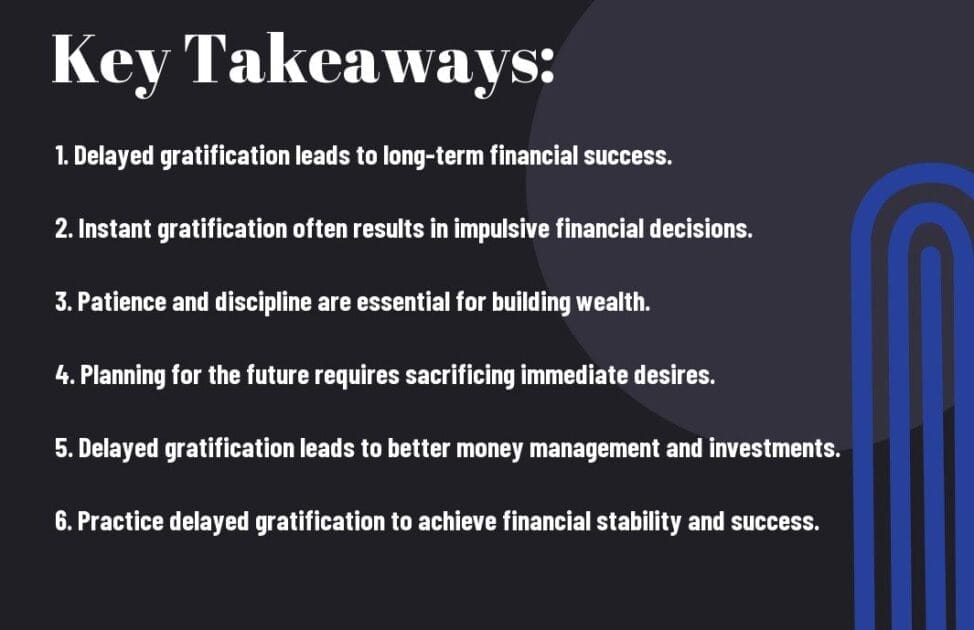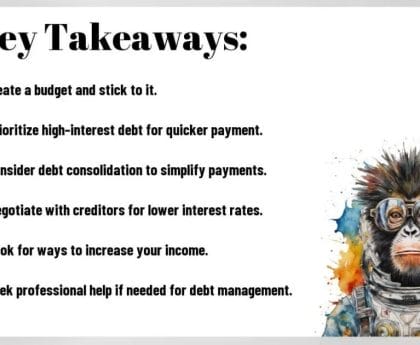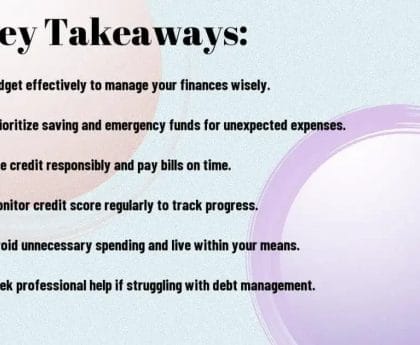In a society where the allure of instant gratification is ever-present, many individuals fall into the trap of prioritizing current desires over long-term financial success. We live in a world where products and services are designed to fulfill our immediate needs, and the pressure to keep up with the personas of others can lead to reckless spending and financial instability. However, the concept of delayed gratification is a fundamental principle that can greatly impact one’s financial well-being. By resisting the temptation of instant rewards and making well-thought-out decisions, individuals can set themselves on the path to financial success. This blog post will delve into the importance of delayed gratification and how it can serve as a key factor in achieving long-term financial stability and prosperity.
Key Takeaways:
- Delayed gratification is a crucial element in achieving financial success. By resisting the temptation of immediate rewards and focusing on long-term goals, individuals can build wealth and financial security.
- Developing the ability to delay gratification requires discipline, self-control, and a willingness to make short-term sacrifices for long-term gains. It involves prioritizing wise financial decisions over impulsive spending.
- Practicing delayed gratification can lead to greater financial stability, increased savings, and the opportunity to invest in valuable assets for the future. By understanding the illusion of instant gratification, individuals can cultivate a mindset that aligns with their long-term financial goals.
The Psychology Behind Instant Gratification
Even though delayed gratification is often associated with long-term success, many people still find themselves drawn to the allure of instant rewards. This is due to several psychological factors that drive individuals to seek immediate gratification.
The Emotional Drivers of Immediate Rewards
Emotional impulses play a significant role in the desire for instant gratification. The rush of dopamine and other feel-good neurotransmitters when receiving an immediate reward can be highly addictive, leading individuals to seek out instant pleasure to fulfill their emotional needs. In a society where stress and anxiety are prevalent, it is easy to succumb to the allure of quick fixes that provide temporary relief.
The Impact of Technology and Social Media
Drivers such as technology and social media have further fueled the desire for instant gratification. With the constant accessibility of online shopping, entertainment, and communication, individuals have become conditioned to expect immediate results. This has had a significant impact on how individuals perceive the value of patience and long-term goals.
Media saturation has also created a culture of comparison, where individuals are constantly exposed to the instant successes of others, further fueling the desire for immediate gratification.
The Power of Delayed Gratification
Your ability to delay instant gratification and opt for long-term rewards can significantly impact your financial success. It involves making decisions that may not provide immediate satisfaction, but ultimately lead to greater rewards in the future. Developing the habit of delayed gratification is crucial for achieving financial stability and building wealth over time.
Case Studies: Success Stories of Patience and Long-Term Planning
Powerful success stories of individuals who have exercised patience and long-term planning in their financial lives can serve as inspiration for those striving for financial success. Let’s examine a few case studies that highlight the benefits of delayed gratification.
- Warren Buffett – Started investing at the age of 11 and became one of the wealthiest individuals in the world through patient long-term investing.
- Elon Musk – Sacrificed short-term financial gain to invest in companies with long-term potential, such as Tesla and SpaceX.
- J.K. Rowling – Faced numerous rejections before achieving massive success with the Harry Potter series, demonstrating the power of persistence and delayed gratification.
The Marshmallow Experiment and Financial Implications
Powerful research, such as the Marshmallow Experiment, has demonstrated the impact of delayed gratification on long-term success. The study showed that children who were able to resist the temptation of an immediate reward in favor of a larger reward later in life exhibited greater financial stability and success in their adult years.
Delayed gratification plays a crucial role in financial decision-making, influencing our ability to save, invest, and resist the lure of impulse purchases and debt accumulation. By consciously practicing delayed gratification, individuals can set themselves on a path towards financial independence and wealth accumulation.
Strategies for Cultivating Delayed Gratification
For individuals seeking financial success, cultivating delayed gratification is essential. This involves making conscious decisions to defer immediate rewards in order to achieve greater long-term benefits. Here are some strategies for developing this crucial skill.
Setting Financial Goals and Priorities
One of the first steps in cultivating delayed gratification is setting clear financial goals and priorities. This involves identifying what you want to achieve in terms of savings, investments, and financial stability. By establishing specific targets, you can create a roadmap for your financial journey and prioritize long-term benefits over short-term indulgences. With clear goals in place, it becomes easier to resist the temptation of instant gratification and stay focused on the bigger picture.
Building Self-Control and Discipline in Spending
One effective way to cultivate delayed gratification is by building self-control and discipline in spending. On a daily basis, individuals can practice mindfulness and restraint when making purchasing decisions, opting for long-term value over short-term pleasures. This may involve creating a budget, setting spending limits, and avoiding impulsive purchases. By exercising self-discipline, individuals can develop the ability to resist immediate temptations and prioritize their long-term financial well-being.
For instance, individuals can challenge themselves to wait a certain period before making non-essential purchases or to save a certain percentage of their income each month. These small actions can lead to significant changes in spending habits and contribute to the cultivation of delayed gratification. By exercising self-control and discipline, individuals can avoid falling into the trap of reckless spending and focus on building a strong financial foundation for the future.
Implementing Delayed Gratification in Personal Finance
To achieve financial success, it is crucial to practice delayed gratification in personal finance. This means making sacrifices and delaying immediate rewards in order to achieve long-term financial goals. Implementing delayed gratification in your personal finances can lead to greater financial stability, wealth accumulation, and ultimately, financial freedom.
Tools for Budgeting and Saving
Saving and budgeting are essential tools for implementing delayed gratification in personal finance. Creating a budget allows you to track your income and expenses, and identify areas where you can cut back on spending in order to save more money. Utilize budgeting apps and tools to help you stay on track and hold yourself accountable. Additionally, consider setting up automatic transfers to a high-yield savings account to ensure that you are consistently saving a portion of your income.
Investment Strategies for Long-Term Growth
Budgeting and saving are important, but investing is also crucial for long-term financial success. Consider investing in a diverse portfolio of stocks, bonds, and real estate to achieve long-term growth. Utilize retirement accounts such as 401(k)s and IRAs to take advantage of tax benefits and compound interest. Additionally, consider speaking with a financial advisor to develop a personalized investment strategy that aligns with your financial goals and risk tolerance.
Plus, remember to regularly review and adjust your investment portfolio to ensure that it continues to align with your long-term financial goals. Rebalance your portfolio as needed and stay informed about market trends and economic indicators to make informed investment decisions.
The Illusion of Instant Gratification – Delayed Gratification as a Key to Financial Success
Upon reflecting on the concept of delayed gratification, it becomes evident that it is a crucial element for achieving financial success. While instant gratification may provide immediate satisfaction, it often leads to long-term consequences such as debt, financial instability, and missed opportunities for growth. In contrast, the practice of delaying gratification allows individuals to make sound financial decisions, cultivate discipline, and build wealth over time. By prioritizing long-term goals and resisting the temptation of immediate rewards, individuals can position themselves for lasting financial success and security. Ultimately, understanding and embracing delayed gratification is essential for navigating the complex landscape of personal finance and achieving long-term financial stability.
FAQ
Q: What is the illusion of instant gratification?
A: The illusion of instant gratification refers to the belief that immediate rewards bring the most long-lasting satisfaction. This mindset can lead to impulsive decisions, overspending, and debt accumulation, ultimately hindering financial success in the long run.
Q: How does delayed gratification contribute to financial success?
A: Delayed gratification involves resisting the temptation of immediate rewards in favor of long-term goals. This mindset allows individuals to prioritize saving, investment, and financial planning, leading to greater wealth accumulation, stability, and overall financial success in the future.
Q: What are some practical strategies for implementing delayed gratification in daily life?
A: Some practical strategies for implementing delayed gratification include creating a budget and sticking to it, setting realistic financial goals, prioritizing needs over wants, building an emergency fund, and cultivating patience when it comes to major purchases. Additionally, seeking out financial education and support can help individuals stay on track and make informed decisions for long-term financial success.






